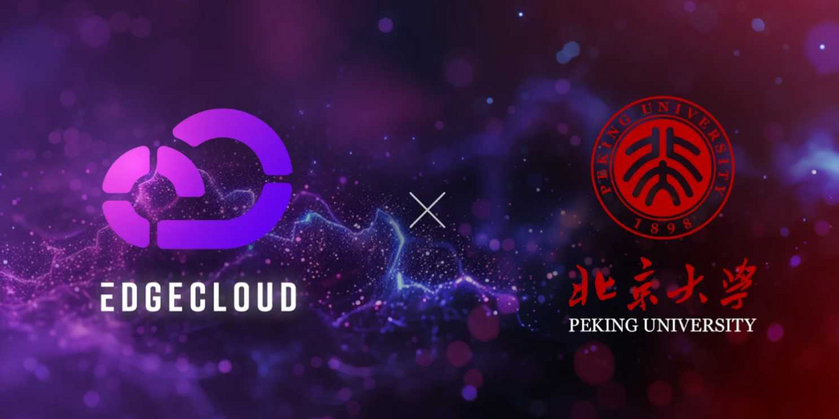We are thrilled to announce the addition of Peking University (also known as Beijing University), ranked Top 10 in the world in computer science alongside MIT and Stanford, as an EdgeCloud AI customer. Theta has achieved significant momentum in both US and Korean academia, with institutions like the University of Oregon, Korea University, Seoul Women’s University (SWU), KAIST, Hankuk University, and Yonsei University utilizing its hybrid cloud GPU infrastructure to advance AI research. EdgeCloud also recently added key corporate customers including Liner, a global leader in generative AI-powered search solutions and Jamcoding, a prominent e-learning coding platform.
This marks an important milestone in Theta’s mission to support advanced AI and blockchain research through hybrid cloud GPU infrastructure. Founded in 1898, Peking University is one of China’s oldest and most prestigious research institutions, renowned for its top-tier programs in science, technology, and innovation and consistently ranked among the world’s leading universities. Known for its pioneering work in AI, distributed computing, and big data research, Peking University will leverage Theta’s high-performance EdgeCloud platform to accelerate innovation across these fields.
About Professor Zhen Xiao and His Research
Professor Zhen Xiao, a renowned researcher in distributed systems and AI, is a tenured professor at the School of Computer Science at Peking University. With a Ph.D. from Cornell University, Professor Xiao leads a lab that has published over 100 high-impact papers featured at leading conferences and journals such as USENIX ATC, SOCC, and IEEE TPDS, accumulating close to 8000 citations — a testament to his influence in research fields including distributed systems, deep learning, blockchain, and cloud computing.
The collaboration between Theta Labs and Professor Xiao started in 2022 when he joined the Theta Advisory Board and was instrumental in the early development of the EdgeCloud platform. The collaboration has also resulted in several joint research papers published in top AI and distributed systems conferences, including:
- CVPR (Conference on Computer Vision and Pattern Recognition): A prestigious forum for computer vision, focusing on AI-driven image and video analysis (paper summary).
- KDD (Knowledge Discovery and Data Mining): The premier event for data mining and machine learning research (paper summary).
- WWW (Web Conference): An influential conference on the future directions of the World Wide Web, including foundational technologies like AI and blockchain (paper summary).
- MM (ACM Multimedia): A key conference for multimedia computing, addressing AI applications across video, image, and audio data (paper summary).
- SRDS (International Symposium on Reliable Distributed Systems): A well-regarded event for research on distributed systems with an emphasis on reliability and security (paper summary).
Through these publications, Prof Xiao’s team together with Theta Labs have contributed significantly to advancements in the cross-section of AI and blockchain, specifically in adaptive defense mechanisms for AI models, distributed AI workload scheduling and placement, scalable blockchain frameworks, and cross-shard transaction optimization.
Enhancing AI Research with Theta EdgeCloud
With the support of EdgeCloud’s hybrid cloud GPU infrastructure, Peking University researchers will be able to scale their AI and distributed computing projects to new heights. EdgeCloud will enable Professor Xiao’s team to carry out state-of-the-art research initiatives in distributed machine learning, blockchain state placement, and neural network optimization.
“I’ve been working with Jieyi and the Theta engineering team for more than two years, and saw the incredible innovation and development that led to the launch of EdgeCloud. It is one of the most complex hybrid GPU infrastructure systems I’ve seen in my career,” ~ said Professor Zhen Xiao.
“Now, I’m thrilled that my AI lab at Peking University and dozens of my researchers and staff members can benefit from using EdgeCloud to drive large-scale distributed AI research. We’re looking forward to replacing all of our existing lab and cloud based GPU resources with EdgeCloud’s hybrid cloud edge infrastructure.”
Professor Xiao and his entire team at Peking University have been instrumental in the development of the EdgeCloud platform and providing us invaluable AI insights in the last three years. Theta now has the most-adopted decentralized GPU platform for academia in Asia, and is quickly expanding to North America and the rest of the world. We believe the next major disruption in AI will come from infrastructure companies that harness distributed GPU and computation at scale, with minimal overhead costs and leverages excess resources and capacity. Theta’s edge network and the EdgeCloud platform is ideally positioned to lead this trend.













 All while Pfizer—a company with a $2.3 billion criminal fine for fraudulent marketing, bribery, and kickbacks—was given blanket immunity from liability and billions in taxpayer dollars to produce a vaccine in record time with no long-term safety data.
All while Pfizer—a company with a $2.3 billion criminal fine for fraudulent marketing, bribery, and kickbacks—was given blanket immunity from liability and billions in taxpayer dollars to produce a vaccine in record time with no long-term safety data.
























